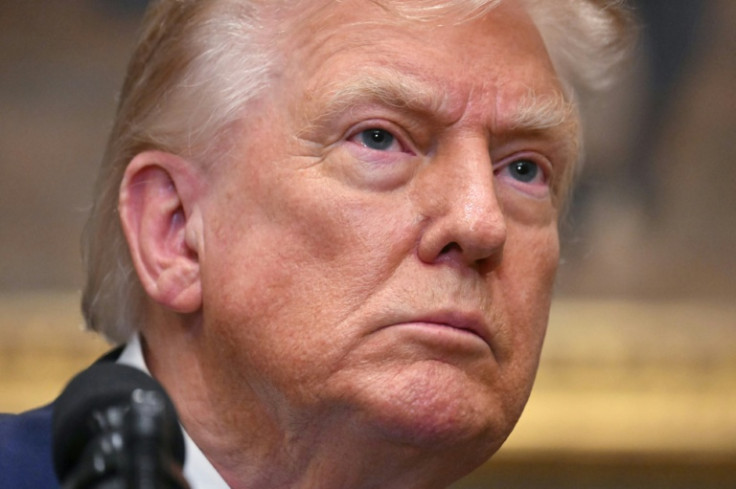
KEY POINTS
- Georgia's Supreme Court upheld a ruling that Fani Willis must be disqualified from Trump's election interference case.
- The decision followed revelations of Willis' romantic relationship with special prosecutor Nathan Wade.
- A new prosecutor will be appointed, but may narrow the charges, continue the case, or dismiss it altogether.
Fulton County District Attorney Fani Willis has been permanently barred from prosecuting President Donald Trump's election interference case in Georgia, after the state's highest court refused to review her appeal.
The Georgia Supreme Court on Tuesday declined, in a 4-3 decision, to take up Willis' request to overturn a ruling from the Court of Appeals that disqualified her and her entire office. The appeals court in December found that Willis' romantic relationship with Nathan Wade, the special prosecutor she appointed to the case, created an 'appearance of impropriety' that required her removal.
Writing for the majority, Justice Andrew Pinson said the appeals court's ruling 'does not raise a question of gravity that warrants our further review'. Chief Justice Nels Peterson did not participate in the case, while Justice Benjamin Land was disqualified.
Justice Carla Wong McMillian, in dissent, argued that additional guidance from the Supreme Court would have been 'desirable', given the confusing legal issues at stake.
The decision leaves the case in limbo and sets in motion a new search for a prosecutor willing to take it on.
Trump and Allies Celebrate
Trump, speaking to reporters at the White House, described the ruling as 'a great decision' and once again labelled the prosecution a 'rigged case'.
His lead defence attorney, Steve Sadow, issued a statement praising the outcome. 'Willis' misconduct during the investigation and prosecution of President Trump was egregious and she deserved nothing less than disqualification. This proper decision should bring an end to the wrongful political, lawfare persecutions of the President', he said.
Jeff Clarke, a former Justice Department official and one of 19 defendants indicted under Georgia's Racketeer Influenced and Corrupt Organizations (RICO) Act, also welcomed the decision. 'Praise the Lord for progress in this case. It never should have been brought in the first place', Clarke said.
In her own statement, Willis acknowledged the defeat but insisted she would cooperate with the next steps. 'While I disagree with the decision of the Georgia Court of Appeals and the Georgia Supreme Court's divided decision not to review it, I respect the legal process and the courts', she said.
Willis added that she would make her case files and evidence available to the Prosecuting Attorneys' Council of Georgia (PACG), which will now decide on the appointment of a replacement prosecutor. 'I hope that whoever is assigned to handle the case will have the courage to do what the evidence and the law demand', she said.
What Happens Next
Pete Skandalakis, the council's executive director, confirmed he will begin the search for a new prosecutor but could not say how long the process would take. He also has the option of taking on the case himself.
'Once a new prosecutor is appointed it will be up to him or her what to do with the case', Skandalakis explained. 'That person could continue on the track Willis had taken, pursue only some charges, or dismiss the case altogether.'
Finding a willing prosecutor may prove difficult, given the case's complexity, political sensitivities and the resources required. Even if someone agrees to pursue the case, the likelihood of Trump being tried while serving as President remains slim. However, 14 other defendants still face charges that could proceed independently.
The Underlying Case
A Fulton County grand jury indicted Trump and 18 others in August 2023, accusing them of conspiring to overturn the 2020 election results in Georgia. The indictment included charges of pressuring state officials, organising 'fake electors' and harassing election workers. Trump surrendered at the Fulton County Jail on 24 August 2023, when his mugshot was taken — the first ever for a former or sitting US president.
Willis, a Democrat, faced scrutiny throughout the investigation and even more so after it emerged she had entered a romantic relationship with Wade, who had been hired to help lead the case. Both Willis and Wade eventually acknowledged the relationship but insisted it had no bearing on the prosecution. Wade resigned earlier this year, but the controversy continued to dog Willis until the appeals court's ruling that disqualified her office.
Ashleigh Merchant, a defence attorney for Trump co-defendant Michael Roman who first exposed the Willis-Wade relationship, said: 'We hope this will finally close this chapter.'
Broader Implications
The disqualification marks a dramatic turn in one of the most high-profile state cases against Trump. It shifts control away from Fulton County's district attorney and into the hands of a bipartisan panel that may be reluctant to inherit such a politically fraught trial.
While Trump remains under federal indictment in other jurisdictions, the unraveling of the Georgia prosecution demonstrates the difficulties of sustaining complex political cases under intense public and judicial scrutiny.
For now, Willis is out, the case is stalled, and the future of one of the most closely watched trials in modern American history is uncertain.







